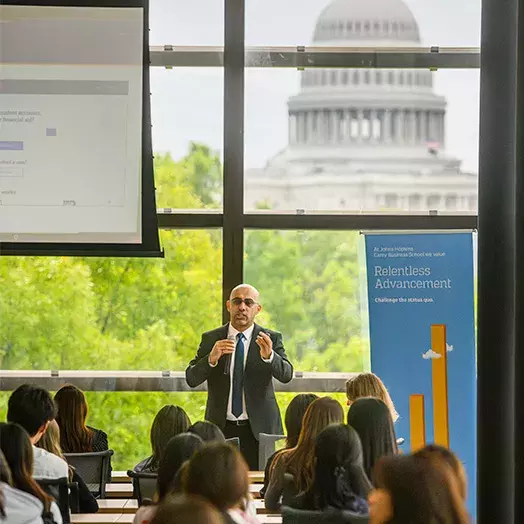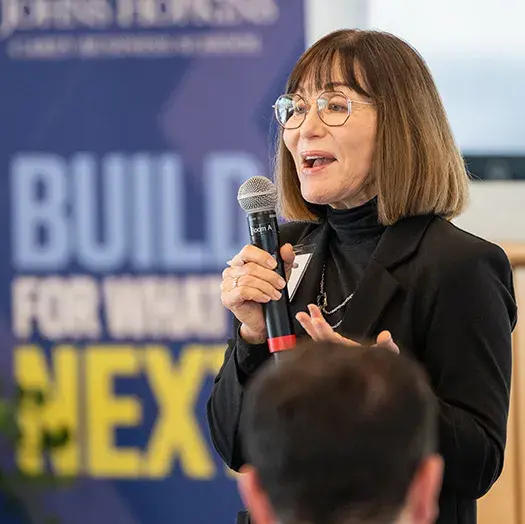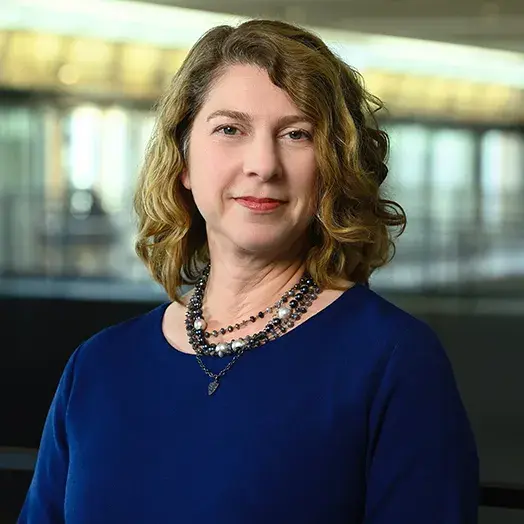Nexus Awards unite Johns Hopkins faculty in addressing societal challenges.

At the Nexus: Emerging stronger from crisis
Amid a world beset by crisis and conflict, could people learn to thrive through such tumultuous events — or even grow stronger? That’s the key question driving a day-long conference that will unfold this fall at the Johns Hopkins University Bloomberg Center in the heart of Washington D.C.
“Traditionally, experts in organizations and international affairs have seen crises as adverse events to be prevented and contained,” notes conference co-planner Brian Gunia, a professor of management at Johns Hopkins Carey Business School. “But today we are living in a world of ongoing and sustained crises and conflicts, on issues ranging from climate change to public health, and it’s critical for scholars to consider how individuals, organizations, and nations might thrive through crisis.”
Gunia and Carey Business School faculty members Suntae Kim and Kathleen Sutcliffe — together with four colleagues from Johns Hopkins’ School of Advanced International Studies, known as SAIS — will bring together Johns Hopkins faculty with expertise on specific crises and conflicts, such as geopolitical tensions and threats to democracy, with leading thinkers from Washington D.C. and beyond, who will offer insights on translating knowledge on these topics into practice.
“Since real-world crises and conflicts often represent two sides of the same coin, we have much to learn about how they relate to each other,” notes Gunia.
The conference, “Thriving through Crisis and Conflict? Interdisciplinary Insights for an Uncertain Future,” scheduled for November 22, is expected to draw about 50 people from inside and outside Johns Hopkins. It is one of 40 wide-ranging projects funded through the Johns Hopkins Nexus Awards, a university-wide initiative launched in 2023 to support convening, research, and teaching anchored at the Bloomberg Center at 555 Pennsylvania Avenue.
Breaking down silos
Conference organizers are planning three keynote addresses throughout the day. Each will be followed by a series of “rapid research talks” — opportunities for faculty members from SAIS and Carey Business School to give brief pitches on their research relating to crisis and conflict.
In addition, community-building sessions will bring together scholars from different disciplines with common interests related to crisis and conflict. The goal is to seed an interdisciplinary community of scholars focused on tackling crisis and conflict from new perspectives. Each group will report to the wider gathering, after which a discussant will synthesize key themes and identify next steps.
Gunia and his fellow planners believe the conference will “plant the seed” for future research-focused collaboration that will break down existing silos.
“At Carey Business School we broadly take a behavioral approach to studying crisis and conflict in organizations — examining managerial, strategic, and economic implications. While at SAIS, we broadly study international conflicts and crises from a historical and case study perspective, examining implications for the international order,” says Gunia. Though both approaches are complementary, “disciplinary differences have traditionally prevented much integration.”
A forward-looking science
By removing barriers to collaboration, Gunia believes the conference has the potential to shift the focus of scholarship on crisis and conflict management — from avoiding crises and conflicts altogether to embracing unavoidable crises and conflicts as constructive opportunities to learn and grow stronger.
What to Read Next

research
Nexus Awards empower Carey faculty to explore gender equity, generative AI, health care policy, and other societal challengesGiven the tumultuous and unpredictable world we find ourselves living in today, it’s more important than ever to find ways for individuals operating at all levels of business and government to find ways to develop resilience, he says.
Though the conference will last just a day, Gunia and his co-planners say it holds the potential to seed lasting, impactful collaboration between Johns Hopkins divisions, launching “a forward-looking science of crisis and conflict with theoretical and practical impact,” potentially through interdisciplinary research, larger-scale multidisciplinary conferences involving internationally renowned scholars, and new academic programs spanning Carey Business School and SAIS.
“Ultimately,” says Gunia, “the goal is to build a contemporary and interdisciplinary science of crisis and conflict anchored at Johns Hopkins.”


